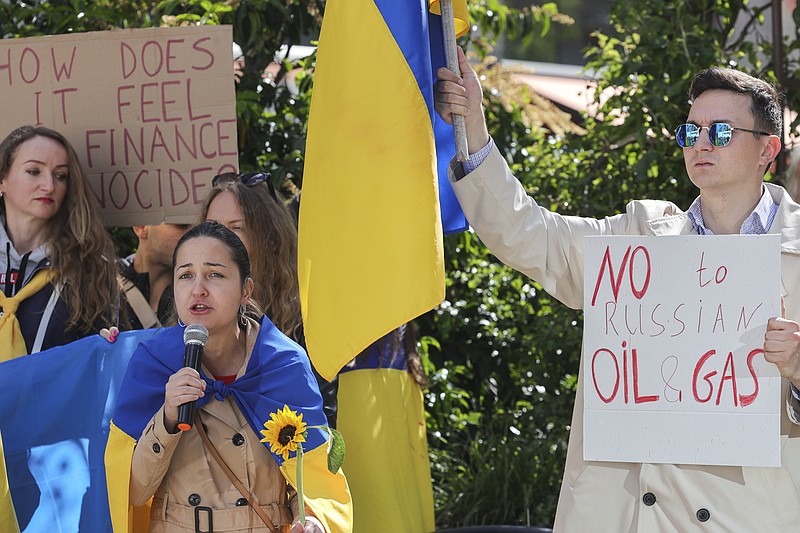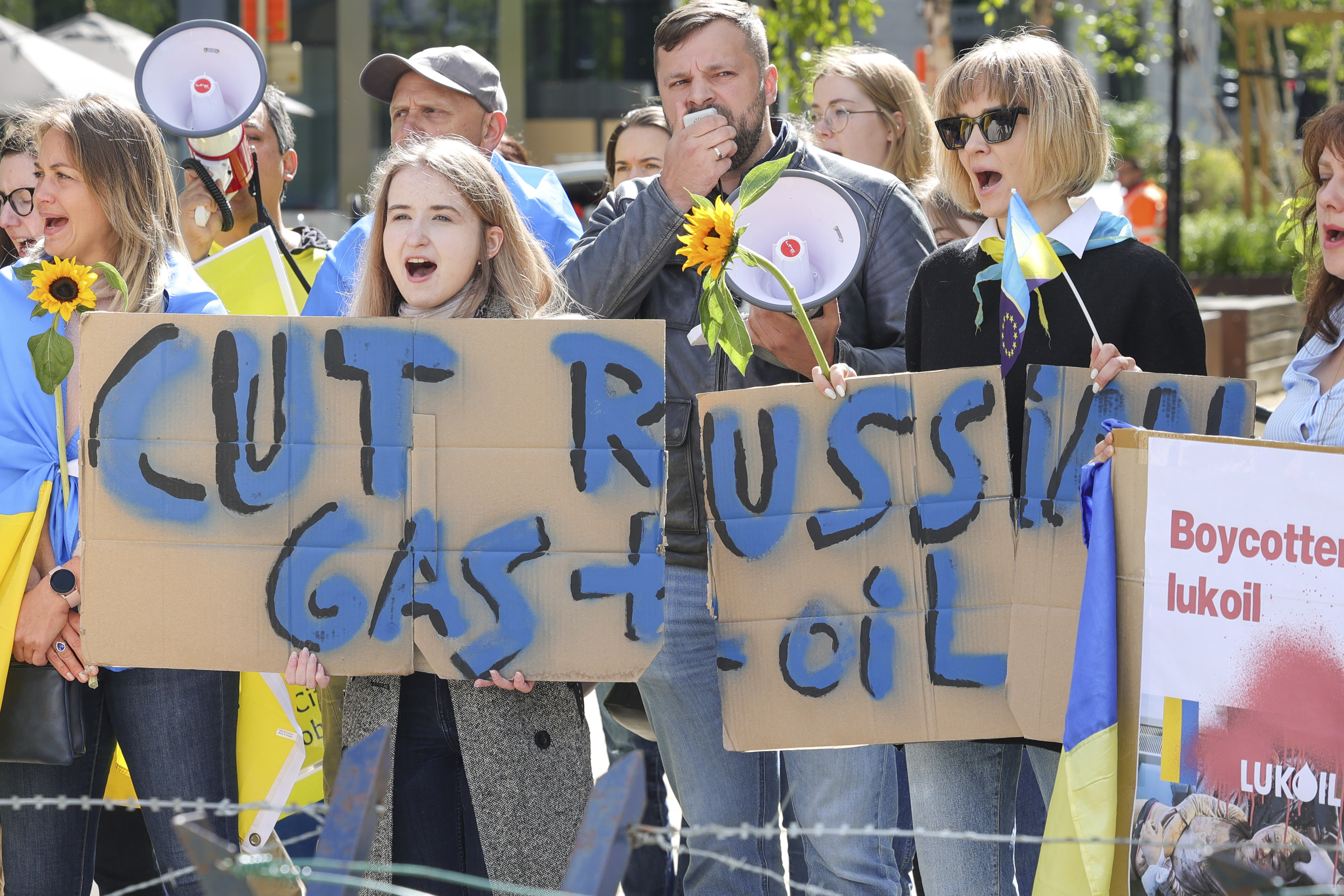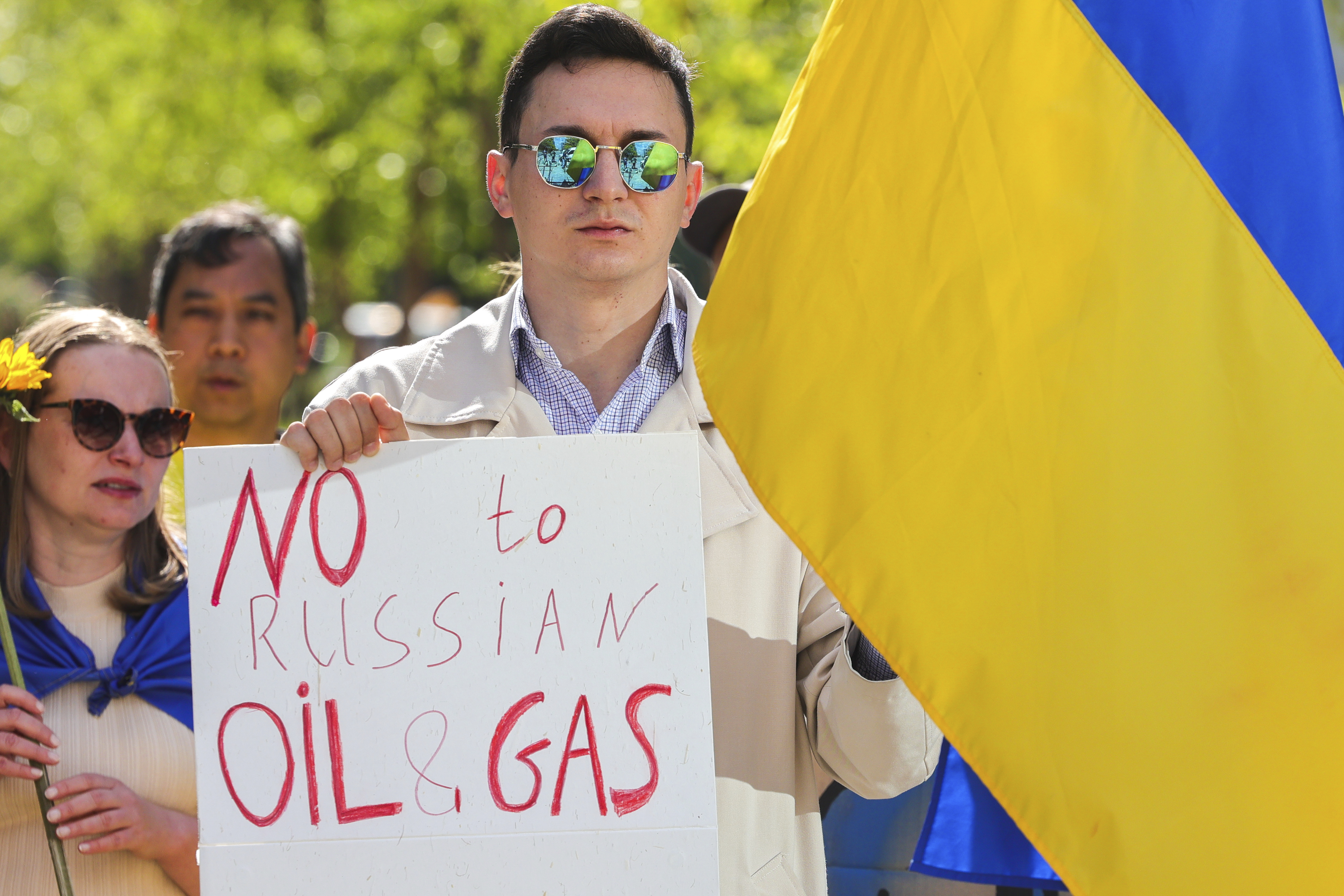BRUSSELS -- European Union leaders reached a compromise Monday to impose a partial oil embargo on Russia at a summit focused on helping Ukraine with a long-delayed package of sanctions that was blocked by Hungary.
The watered-down embargo covers only Russian oil brought in by sea, allowing a temporary exemption for imports delivered by pipeline. EU Council President Charles Michel said the agreement covers more than two-thirds of oil imports from Russia.
The new package of sanctions will also include an asset freeze and travel ban on individuals, while Russia's biggest bank, Sberbank, will be excluded from SWIFT, the major global system for financial transfers from which the EU previously banned several smaller Russian banks. Three big Russian state-owned broadcasters will be prevented from distributing their content in the EU.
"We want to stop Russia's war machine," Michel said, lauding what he called a "remarkable achievement."
The EU had already imposed five previous rounds of sanctions on Russia. It has targeted more than 1,000 people individually, including Russian President Vladimir Putin and top government officials as well as pro-Kremlin oligarchs, banks and the coal sector.
But the sixth package of measures announced May 4 had been held up by concerns over oil supplies.
The impasse embarrassed the bloc, which was forced to scale down its ambitions in a bid to get Hungary on board. When European Commission President Ursula von der Leyen proposed the package, the initial aim was to phase out imports of crude oil within six months and refined products by the end of the year.
Michel and von der Leyen said leaders will soon return to the issue, seeking to guarantee that Russia's pipeline oil exports to the EU are banned at a later date.
Hungarian Prime Minister Viktor Orban had made clear he could support the new sanctions only if his country's oil security was guaranteed. The landlocked country gets more than 60% of its oil from Russia and depends on crude that comes through the Soviet-era Druzhba pipeline.
Von der Leyen had played down the chances of a breakthrough at the summit. But leaders reached a compromise after Ukrainian President Volodymyr Zelenskyy urged them to end "internal arguments that only prompt Russia to put more and more pressure on the whole of Europe."
Von der Leyen said the move will "effectively cut around 90% of oil imports from Russia to the EU by the end of the year."
The EU gets about 40% of its natural gas and 25% of its oil from Russia, and divisions over the issue exposed the limits of the 27-nation trading bloc's ambitions.
Zelenskyy said the sanctions package must "be agreed on, it needs to be effective, including (on) oil," so that Moscow "feels the price for what it is doing against Ukraine" and the rest of Europe. Only then, Zelenskyy said, will Russia be forced to "start seeking peace."
It was not the first time he had demanded that the EU target Russia's lucrative energy sector and deprive Moscow of billions of dollars a day.
But Hungary, leading a group of EU countries including Slovakia, the Czech Republic and Bulgaria, relies heavily on Russia for energy and can't afford to turn off the pumps. In addition to its need for Russian oil, Hungary gets 85% of its natural gas from Russia.
Orban had been adamant on arriving at the two-day summit that a deal was not in sight, stressing that Hungary needed its energy supply secured.
Von der Leyen and Michel said the commitment by Germany and Poland to phase out Russian oil by the end of the year and to forgo oil from the northern part of the Druzhba pipeline will help cut 90% of Russian oil imports.
The summit also focused on continued EU financial support to Ukraine -- a $9.7 billion tranche -- and on military help and war crimes investigations.
The issue of food security will be on the table today, with the leaders set to encourage their governments to speed up work on "solidarity lanes" to help Ukraine export grain and other produce.
Some protesters gathered outside EU buildings Monday before the summit, holding signs such as "No to Russian oil and gas."
PAYMENT ARRANGEMENTS
Russia said Monday it may use an arrangement similar to that used for payments for its gas supplies to pay its dollar-denominated foreign debts.
The Vedomosti business daily quoted Finance Minister Anton Siluanov as saying that Russia will offer the holders of its Eurobond obligations a payment system bypassing Western financial infrastructure.
Russia previously has suggested that its natural gas customers establish an account in dollars or euros at Russia's third-largest bank, Gazprombank, then a second account in rubles. The importer would pay the gas bill in euros or dollars and direct the bank to exchange the money for rubles.
The system was established on Putin's order and aims to avoid a risk of gas payments being frozen as part of Western sanctions.
Siluanov told Vedomosti that a mechanism similar to that will be set for Eurobond holders, who will be offered the chance to open foreign currency and ruble accounts at a Russian bank.
"In payments for gas, we are credited with foreign currency and it's converted into rubles," Siluanov was quoted by Vedomosti as saying. "The Eurobond settlement mechanism will work in the same way, just in the other direction."
He said payments will be made through Russia's National Settlement Depository.
Asked about Siluanov's comments, Kremlin spokesman Dmitry Peskov told reporters that "the practice of payments for gas has proven to be convenient for both the seller and the buyers, so why not to use it in the opposite form."
LICENSE EXPIRES
On Wednesday, the U.S. Treasury Department led by Janet Yellen allowed a license that permitted Russia to keep paying its debtholders through American banks to expire. The license applied to American investors and international investors who have dollar-denominated debt or bonds.
It's not clear whether the new Russian offer will be accepted by Eurobond holders, allowing Russia to avoid a default.
Russia has not defaulted on its international debts since the 1917 Bolshevik Revolution, when the Russian Empire collapsed and the Soviet Union was created. Russia defaulted on its domestic debts in the late 1990s during the Asian financial crisis, but was able to recover from that default with the help of international aid.
Information for this article was contributed by Lorne Cook, Samuel Petrequin, Karel Janicek and additional reporters for the Associated Press.
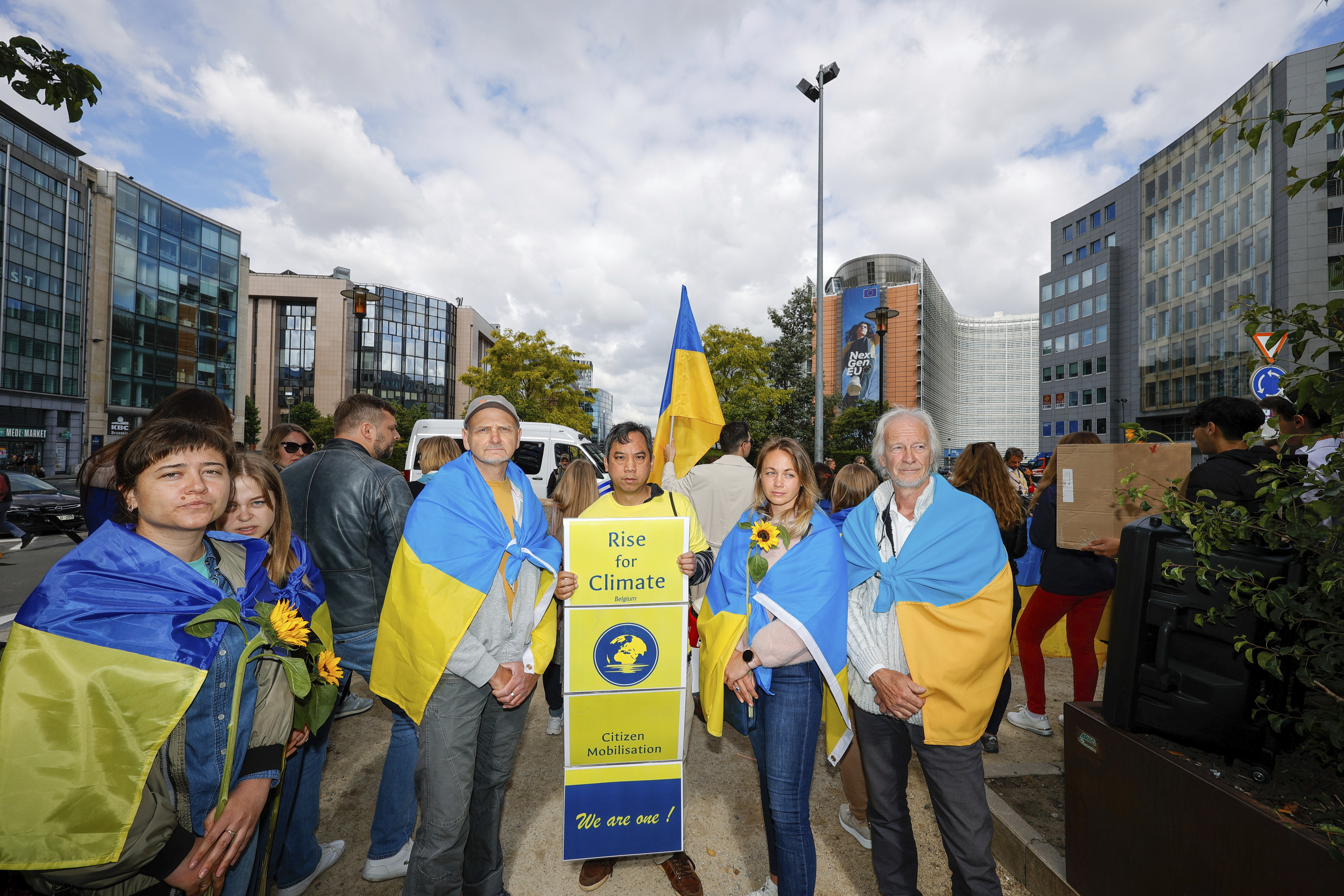 Ukrainian demonstrators demand an embargo on Russian oil during a protest in front of EU institutions prior to an extraordinary meeting of EU leaders to discuss Ukraine, energy and food security at the Europa building in Brussels, Monday, May 30, 2022. European Union leaders will gather Monday in a fresh show of solidarity with Ukraine but divisions over whether to target Russian oil in a new series of sanctions are exposing the limits of how far the bloc can go to help the war-torn country. (AP Photo/Olivier Matthys)
Ukrainian demonstrators demand an embargo on Russian oil during a protest in front of EU institutions prior to an extraordinary meeting of EU leaders to discuss Ukraine, energy and food security at the Europa building in Brussels, Monday, May 30, 2022. European Union leaders will gather Monday in a fresh show of solidarity with Ukraine but divisions over whether to target Russian oil in a new series of sanctions are exposing the limits of how far the bloc can go to help the war-torn country. (AP Photo/Olivier Matthys)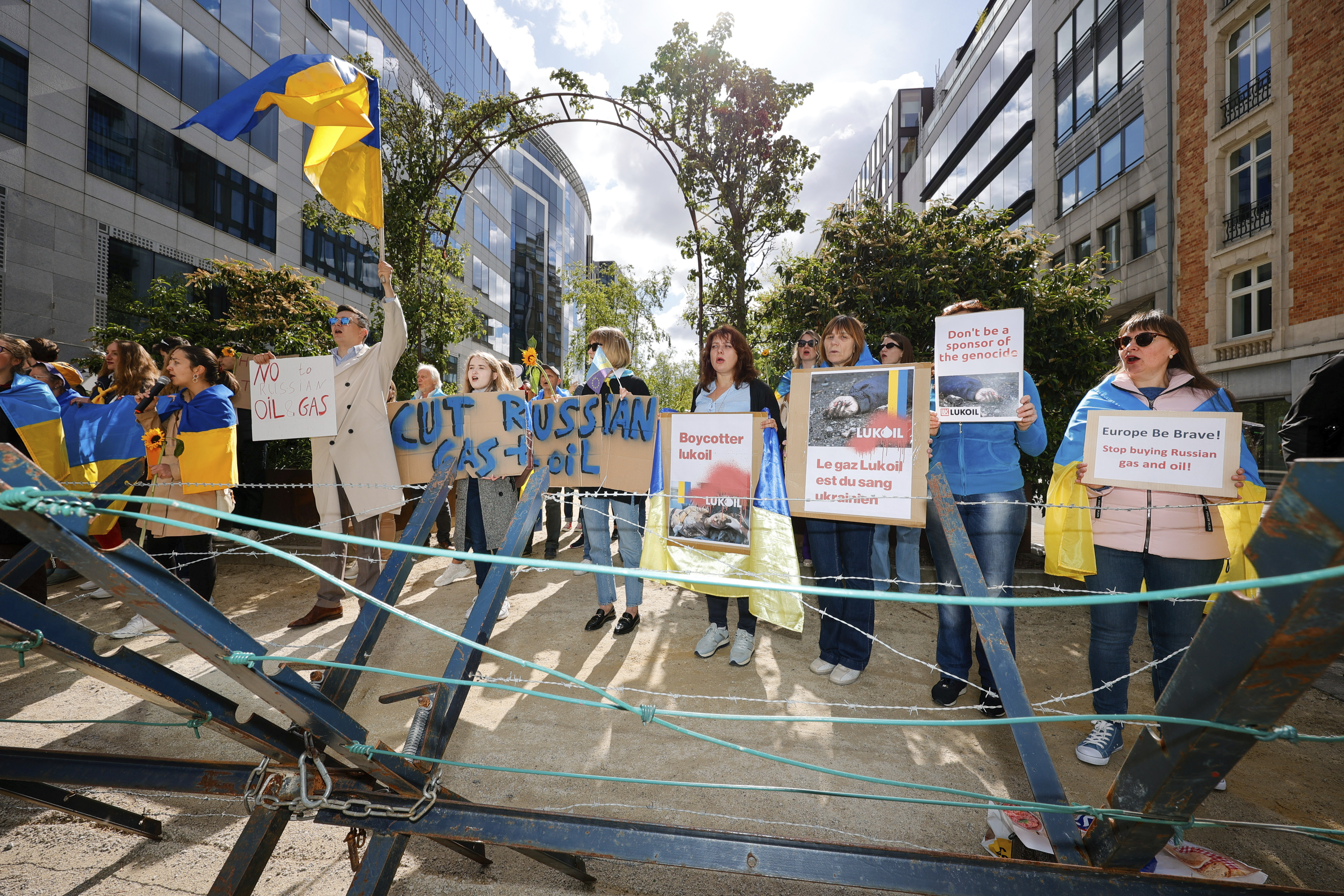 Ukrainian demonstrators demand an embargo on Russian oil during a protest in front of EU institutions prior to an extraordinary meeting of EU leaders to discuss Ukraine, energy and food security at the Europa building in Brussels, Monday, May 30, 2022. European Union leaders will gather Monday in a fresh show of solidarity with Ukraine but divisions over whether to target Russian oil in a new series of sanctions are exposing the limits of how far the bloc can go to help the war-torn country. (AP Photo/Olivier Matthys)
Ukrainian demonstrators demand an embargo on Russian oil during a protest in front of EU institutions prior to an extraordinary meeting of EU leaders to discuss Ukraine, energy and food security at the Europa building in Brussels, Monday, May 30, 2022. European Union leaders will gather Monday in a fresh show of solidarity with Ukraine but divisions over whether to target Russian oil in a new series of sanctions are exposing the limits of how far the bloc can go to help the war-torn country. (AP Photo/Olivier Matthys) Ukrainian demonstrators demand an embargo on Russian oil during a protest in front of EU institutions prior to an extraordinary meeting of EU leaders to discuss Ukraine, energy and food security at the Europa building in Brussels, Monday, May 30, 2022. European Union leaders will gather Monday in a fresh show of solidarity with Ukraine but divisions over whether to target Russian oil in a new series of sanctions are exposing the limits of how far the bloc can go to help the war-torn country. (AP Photo/Olivier Matthys)
Ukrainian demonstrators demand an embargo on Russian oil during a protest in front of EU institutions prior to an extraordinary meeting of EU leaders to discuss Ukraine, energy and food security at the Europa building in Brussels, Monday, May 30, 2022. European Union leaders will gather Monday in a fresh show of solidarity with Ukraine but divisions over whether to target Russian oil in a new series of sanctions are exposing the limits of how far the bloc can go to help the war-torn country. (AP Photo/Olivier Matthys)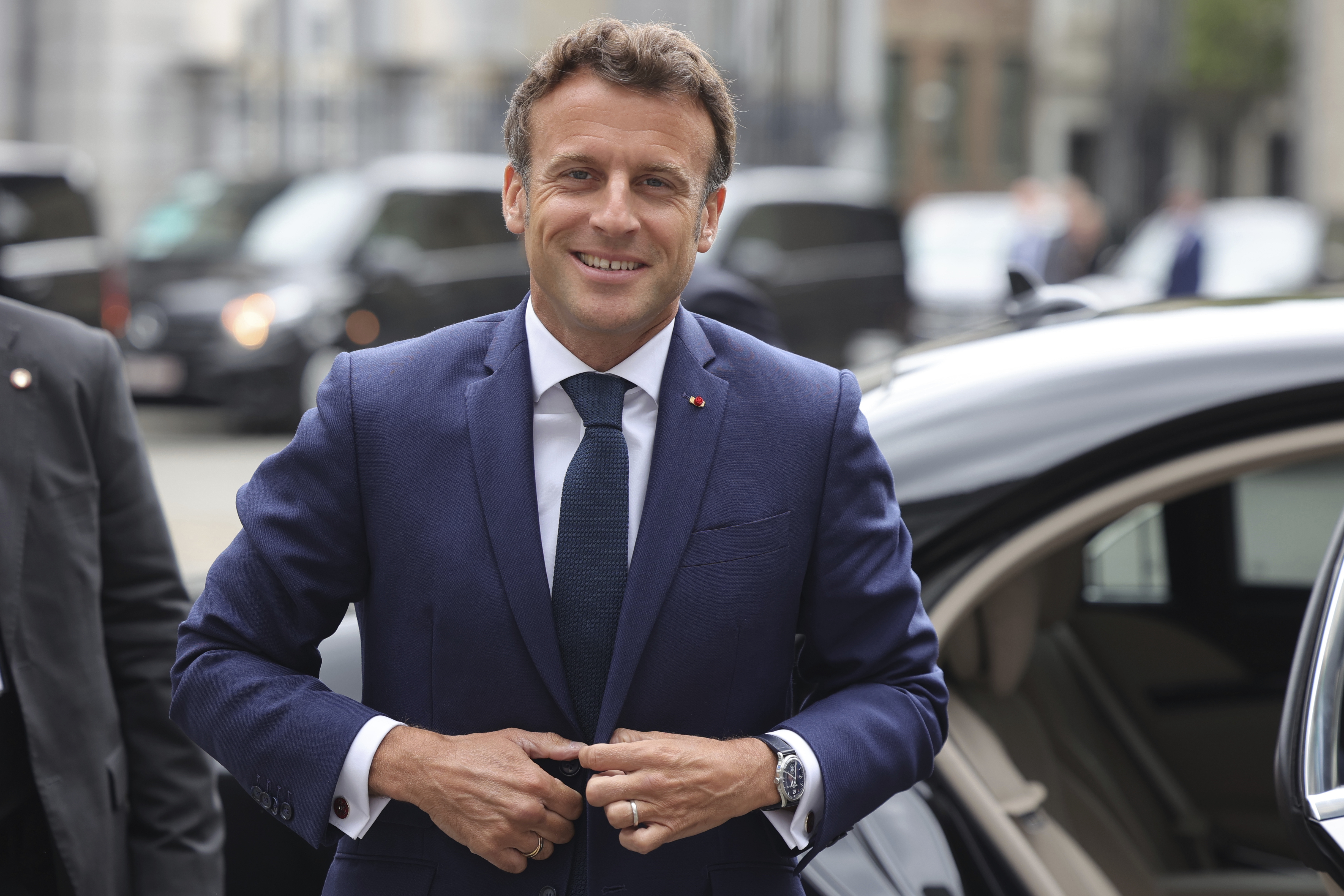 French President Emmanuel Macron arrives for the an extraordinary meeting of EU leaders to discuss Ukraine, energy and food security in Brussels, Monday, May 30, 2022. European Union leaders will gather Monday in a fresh show of solidarity with Ukraine but divisions over whether to target Russian oil in a new series of sanctions are exposing the limits of how far the bloc can go to help the war-torn country. (AP Photo/Olivier Matthys)
French President Emmanuel Macron arrives for the an extraordinary meeting of EU leaders to discuss Ukraine, energy and food security in Brussels, Monday, May 30, 2022. European Union leaders will gather Monday in a fresh show of solidarity with Ukraine but divisions over whether to target Russian oil in a new series of sanctions are exposing the limits of how far the bloc can go to help the war-torn country. (AP Photo/Olivier Matthys)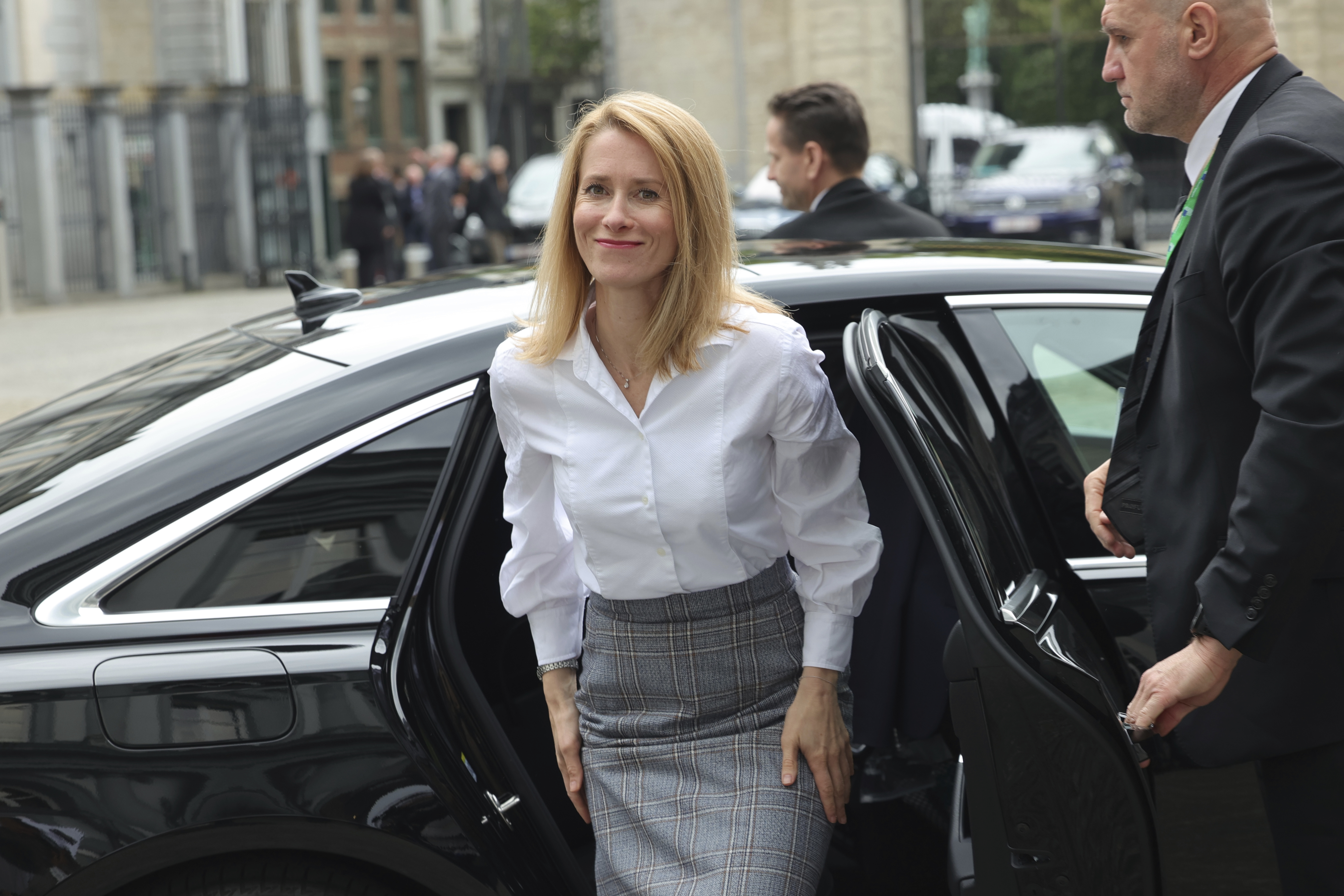 Estonian Prime Minister Kaja Kallas arrives for the an extraordinary meeting of EU leaders to discuss Ukraine, energy and food security in Brussels, Monday, May 30, 2022. European Union leaders will gather Monday in a fresh show of solidarity with Ukraine but divisions over whether to target Russian oil in a new series of sanctions are exposing the limits of how far the bloc can go to help the war-torn country. (AP Photo/Olivier Matthys)
Estonian Prime Minister Kaja Kallas arrives for the an extraordinary meeting of EU leaders to discuss Ukraine, energy and food security in Brussels, Monday, May 30, 2022. European Union leaders will gather Monday in a fresh show of solidarity with Ukraine but divisions over whether to target Russian oil in a new series of sanctions are exposing the limits of how far the bloc can go to help the war-torn country. (AP Photo/Olivier Matthys)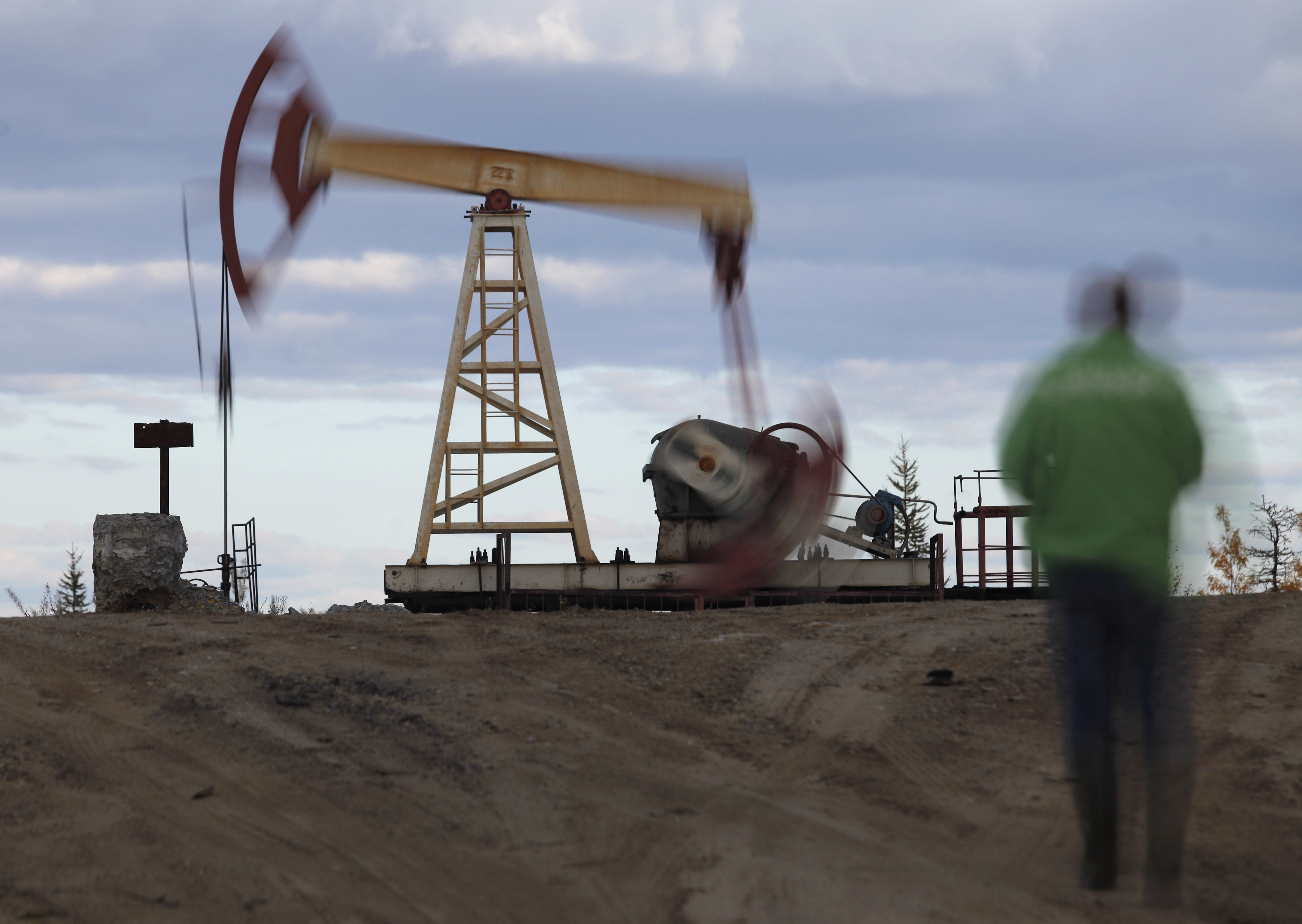 FILE - Sept. 10, 2011 file photo photo showing an oil rig near the town of Usinsk, 1500 kilometers (930 miles) northeast of Moscow. The European Union's executive commission has proposed phasing out imports of Russian oil within six months. It is part of Europe's struggle to stop paying Russia $850 million a day for energy and hit the Kremlin's finances over its invasion of Ukraine. (AP Photo/Dmitry Lovetsky)
FILE - Sept. 10, 2011 file photo photo showing an oil rig near the town of Usinsk, 1500 kilometers (930 miles) northeast of Moscow. The European Union's executive commission has proposed phasing out imports of Russian oil within six months. It is part of Europe's struggle to stop paying Russia $850 million a day for energy and hit the Kremlin's finances over its invasion of Ukraine. (AP Photo/Dmitry Lovetsky)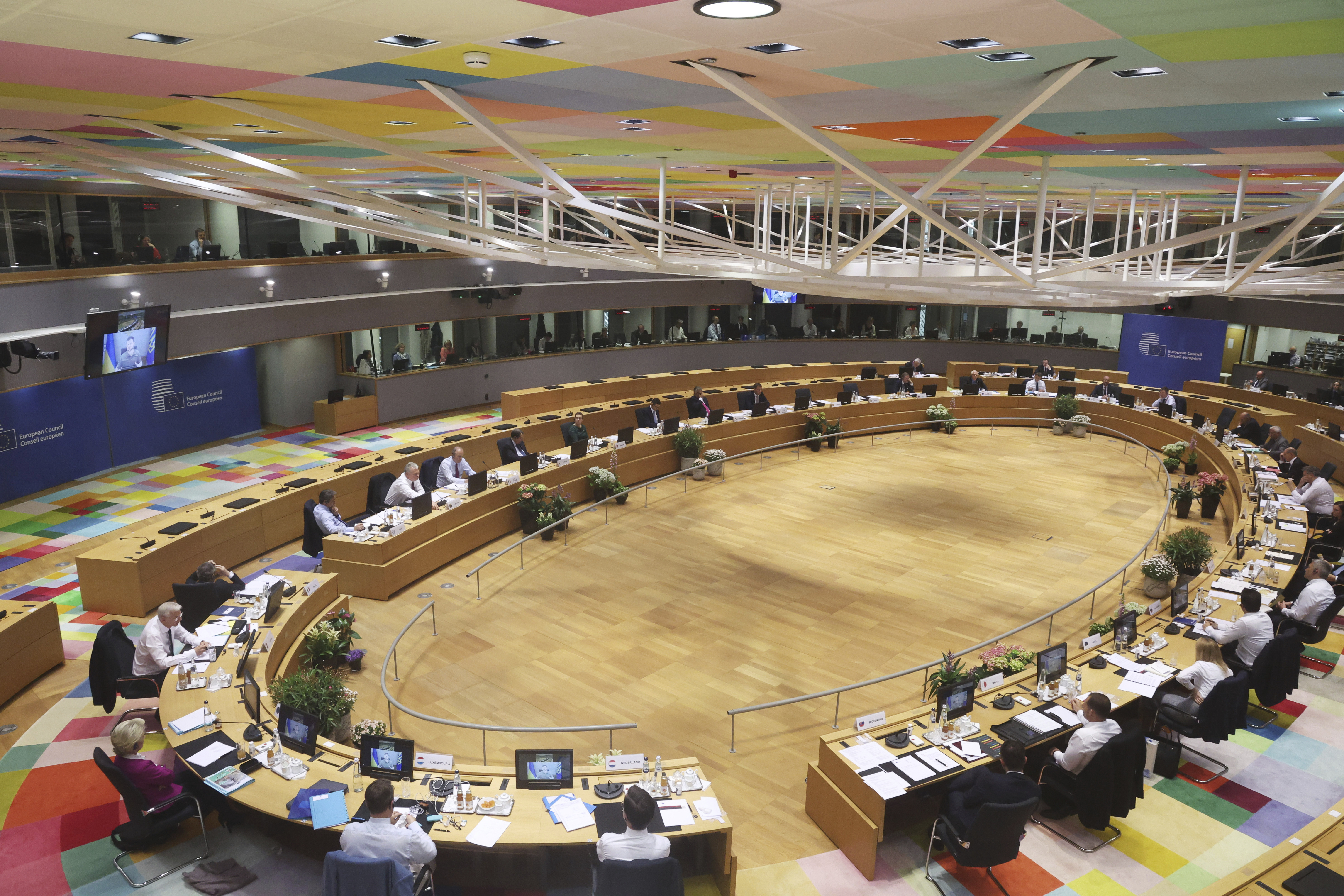 Ukrainian President Volodymyr Zelenskyy is seen on a screen, left, as addresses from Kyiv during an extraordinary meeting of EU leaders to discuss Ukraine, energy and food security at the Europa building in Brussels, Monday, May 30, 2022. European Union leaders will gather Monday in a fresh show of solidarity with Ukraine but divisions over whether to target Russian oil in a new series of sanctions are exposing the limits of how far the bloc can go to help the war-torn country. (AP Photo/Olivier Matthys)
Ukrainian President Volodymyr Zelenskyy is seen on a screen, left, as addresses from Kyiv during an extraordinary meeting of EU leaders to discuss Ukraine, energy and food security at the Europa building in Brussels, Monday, May 30, 2022. European Union leaders will gather Monday in a fresh show of solidarity with Ukraine but divisions over whether to target Russian oil in a new series of sanctions are exposing the limits of how far the bloc can go to help the war-torn country. (AP Photo/Olivier Matthys)